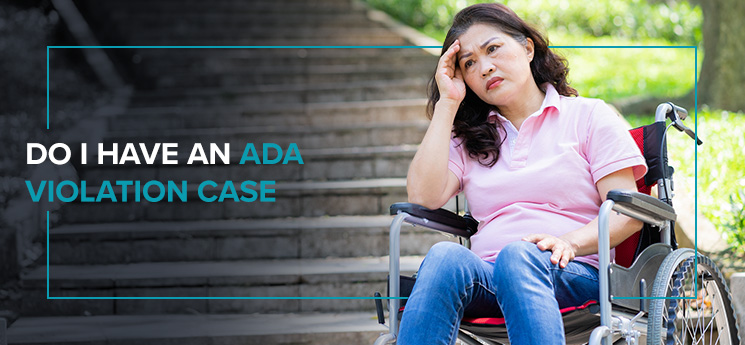The Americans With Disabilities Act (ADA) protects the rights of individuals with disabilities, ensuring they can receive the right accommodations, resources and treatment while protecting them from discrimination. The ADA splits regulation and enforcement into several titles. Title I applies to employment, protecting employees with disabilities in the workplace and setting requirements for employers to create a safe and healthy environment.
Title I has many standards and protections. For example, pursuant to Title I of the ADA, employers must create an accessible environment and provide reasonable accommodations that allow individuals to complete their regular tasks. Further, they cannot discriminate against individuals with disabilities during the hiring, promoting and firing processes.
When employers fail to treat employees with disabilities with fairness or provide proper accommodations, they can face legal consequences.
Do You Have an ADA Violation Case?
If your employer violates rights provided under the ADA, you can file a complaint and lawsuit against them. Understanding the actions you can take against employers can further protect your rights.
Reasons to File a Discrimination Lawsuit
The ADA protects individuals with disabilities from discrimination related to disability. Victims of discrimination can pursue legal recourse, and actional discrimination can take many different forms. For example, violations under Title I can be rooted in behaviors or treatments from an employer, co-worker or overall workplace.
Some examples of more common Title I violations include:
- Discriminating in the hiring process: Employers might overlook candidates to halt hiring processes after learning about disabilities. Individuals with the right qualifications should receive the same consideration during the hiring process as other candidates.
- Failing to accommodate individuals: Employers must provide employees with disabilities with reasonable accommodations. The ADA defines reasonable accommodations as ones that support the individual in completing essential tasks and do not cause undue hardship or direct threats. Accommodations can look different for every individual and condition, so employers must work with employees to establish proper accommodations if it is not unduly burdensome to do so. Reasonable accommodations might also depend on their cost to employers and their operational structure.
- Treating individuals with disabilities differently: Employers and co-workers might treat individuals with disabilities differently and make assumptions about their capabilities in the workplace. They might exclude them from activities and opportunities or assign them menial tasks below their position. This type of treatment can be grounds for a lawsuit.
- Experiencing harassment in the workplace: Harassment can take many forms. In the context of ADA violations, this often involves name-calling, stereotyping and other malicious behavior toward an employee based on that employee’s disability. Employees who faced harassment, especially if management did not intervene, can pursue legal action.
- Overlooking individuals for promotions: Individuals with disabilities deserve the same opportunities for career development as their peers. Unless they lack the right experience and qualifications, ignoring or denying promotions can be an ADA violation.
- Firing individuals for their disabilities: Wrongful discharge over injuries, illnesses or accommodation requests violates individuals’ rights to work where they qualify.
- Being regarded as disabled: Individuals without disabilities can experience harassment and discrimination protected by ADA. Regarding someone as disabled means wrongly assuming and treating them as disabled, like reducing their tasks or harassing them.
Knowing your rights and common workplace violations allows you to identify when you can pursue legal action.
How to File a Discrimination Complaint
Before you can sue your employer for an ADA violation, you must file a discrimination complaint. In Pennsylvania, two pieces of legislation protect individuals from disability discrimination — the ADA, a federal law, and a state law called the Pennsylvania Human Relations Act (PHRA). The ADA covers employers with 15 or more employees, while the PHRA covers employers with as few as 4 or more employees.
Because they originate from different governing bodies, the two laws have separate enforcers. The U.S. Equal Employment Opportunity Commission (EEOC) enforces the ADA, while the Pennsylvania Human Relations Commission (PHRC) enforces the PHRA.
When making an ADA claim against your employer, you can file your ADA Title I complaint with the EEOC or the PHRC. Each has unique processes for filing complaints and proceeding with lawsuits.
The EEOC requires you to submit your claim within 180 to 300 days of the discrimination incident. After filing, the EEOC may send both parties to mediation to try and reach a common solution. The average investigation period is about 10 months after filing.
The investigation findings can result in the EEOC filing a lawsuit on your behalf or issuing a Notice of Right to Sue, which gives you the right to proceed with a lawsuit under the ADA. If you want to file your lawsuit before the investigation has occurred, you can request a Notice of Right to Sue from the EEOC after 180 days.
When filing a similar discrimination complaint with the PHRC, you also have 180 days from the incident to file your complaint. Like filing with the EEOC, complaints usually come with an investigation examining the incident in question. Regardless of which organization you decide to submit the complaint to, the other organization will automatically file a report and keep records of it.
What Can You Sue for?
When filing a lawsuit against your employer for an ADA violation or disability discrimination, you can seek various damages depending on your case’s circumstances. Some damages you can sue for in ADA violation lawsuits include:
- Lost wages.
- Back pay.
- Front pay.
- Compensatory damages.
- Punitive damages.
- Attorney fees.
- Other associated costs.
How to Prove an ADA Violation
When taking the alleged ADA violation to court or investigation, you must provide proof based on your claims and discriminatory circumstances. Each case will require different evidence and documentation depending on what you must prove. Regardless, the burden of proof is on the individual bringing the claim, so understanding what you must prepare is essential.
Proving Disability
The first portion of bringing a matter forward under the ADA requires proving your disability. The ADA defines a disability as a mental or physical impairment that limits at least one significant major life activity, whether personal or professional.
The ADA includes individuals with past disabilities, such as someone in remission from cancer, protecting them from discrimination. They classify as individuals with records of disabilities.
When the courts ask for proof of disability, you may have to provide medical records that show a history of mental and physical impairment.
Proving ADA Violation
After you prove your rights fall under ADA protection, you will also need to provide evidence of your discrimination claims and complaints. This factor will look different for each case because disability discrimination and ADA violations can take many forms.
For example, you might provide email chains or forms showing employers denying your requests for specific and necessary accommodations. Individuals experiencing harassment can provide records of texts, emails, chats and phone calls displaying the discriminatory behavior of coworkers or supervisors.
Investigation processes can help provide internal evidence of discrimination and ADA violations in the workplace.
Partner With an Employment Attorney From Weisberg Cummings
A knowledgeable attorney can walk you through the benefits you can earn from your lawsuit and what you will need to accomplish your desired results. The attorneys at Weisberg Cummings specialize in employment law, with various experiences in discrimination cases and ADA violations in Pennsylvania. Our teams will guide you through your next steps and how to navigate legal systems.
Contact Weisberg Cummings today for a free consultation and discover how we can help you with your ADA violation case.



